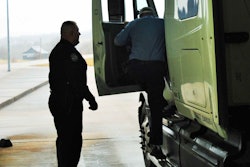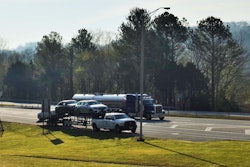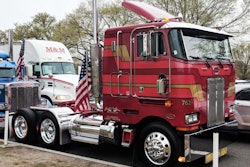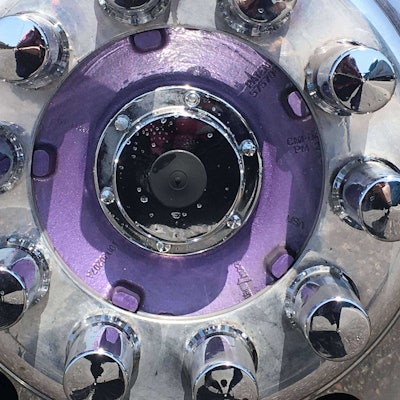
I invoked it somewhat hopefully after the hours seminar at the Mid-America Trucking Show went off the rails almost two weeks back. Two people in attendance walked away from that session to very shortly act separately on similar instincts. Marion, Ind.-based John Allen, who’d been a part of the October meeting with FMCSA officials during the D.C. protest actions and had been frustrated with his own attempts to reconnect since, sent an email to the presenter from the MATS session, Joe Delorenzo, expressing a desire to engage with a productive discussion around driver issues. By the next morning, after some back and forth discussion, the trucker (Allen is currently off the road dispatching and doing other work, gearing up to reactivate his authority to truck under the Life on the Roads name) had a sit-down with regulators set for April 2 in D.C.
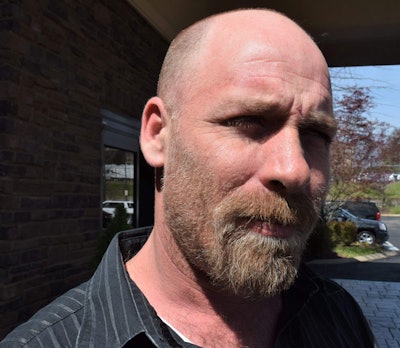 John Allen
John AllenThat Monday, too, Andrea Marks drafted and sent her own message to regulators in part about the well of emotion that sprung from the meeting, likewise expressing the desire to engage. Marks is a U.S. Department of Agriculture career employee and in a family of livestock-hauling owner-ops she handles compliance for. Otherwise, she’s administrator of the ELD or Me Facebook group and communications director for the newly-minted Trucker Nation organization that has grown from that page.
Allen and Marks ultimately came together and went to D.C. this past Monday for the meeting, with several others also in attendance, including owner-operator Ingrid Brown, Treena Morgan, MyRiteLoad’s Matthew Kane and Tony Justice, the trucker/singer-songwriter who launched the ELD or Me Facebook group last year.
At issue in the meeting, primarily, was the regulatory area where, particularly after MATS, it seemed there was some possibility for nearer-term change — the hours of service. “We were trying to get the [required 10-hour off-duty period] to be split to stop the 14-hour clock” in more than just 8-hour/2-hour periods. “That was the whole goal intended,” says Allen, who added that officials in his view are in fact “wanting to do something” to help alleviate pressures truckers are under, but “just like anything, they have steps they have to follow.”
Until that happens, “we’re on standby working through them, trying to get things to happen,” he says.
Marks says meeting attendees, including herself, “all left feeling encouraged. FMCSA said many times that they considered that the first conversation of many.”
What’s resulted is work on a potential petition to the agency that would go a bit farther than the Owner-Operator Independent Drivers Association’s recent petition for a three-hour “pause button” for the 14-hour clock to extend the duty day, a proposal also floated in a Congressional bill by Texas rep. Brian Babin recently. Marks says they’re working on a petition to allow sleeper splitting when at least a 3-hour rest period is taken to stop the 14-hour clock. Other options than a 3/7 split of the 10-hour break would also be available — including 4/6, 5/5 — under the proposal.
“Not only would this allow for everyone’s different sleeping habits” and not penalize a driver for making a safety call to get off the road, Justice says, “it will also relieve some of the lack of parking.”
Marks notes of a petition in the works, “if the driver chose to use that time, they would be exempt from having to use the 30-minute break,” Marks notes. Otherwise, the 30-minute break would remain in place. They’re contemplating a request for an extra 30 minutes of duty time for those who take the break.
Marks notes the group brought logbook examples showing how the splits might be logged, and action items for the next meeting as early as four weeks from now included to build electronic examples for regulators.
References were made to the FMCSA’s movement toward a naturalistic study of how split sleep affects fatigue — or not — among truckers, which I’ve routinely referenced myself here in Channel 19. Regarding the study, Marks says, FMCSA “very explicitly stated, they are closer than ever to [allowing use of] the split sleeper berth.”
“Soon” in regulatory time means something different than what it does out here in the real world. Marks suggested that 12-18 months would be about as fast a process to make a change of this magnitude could move. So … expect it to drag on for quite some time. She’s reaching out to other associations, including OOIDA, about potentially backing the petition, too, to give it greater heft with regulators.
Allen, for his part, has ultimately been heartened by the willingness of officials to engage at this stage. He noted he’d exchanged several messages with regulators in the days following the meeting, as did all of the attendees, Marks says.
“The main thing is people have to realize nothing is going to happen overnight,” Allen says. While “everybody wants to go to D.C.,” a reference to groups of truckers planning to demonstrate next week in the nation’s capital, “I think it will make us look worse more so than help us. I know we got a bunch of backlash in October because of what some people did there.”
More impact, Allen suggested, is being made daily as truckers raise rates to compensate for diminished productivity and send the message of just what regulatory change has wrought to industry players on the spot market and ultimately to American consumers. As for FMCSA, they’re not budging on the ELD mandate, and regulators in some ways “like the ELD mandate because it’s exposing the problems” in the hours of service, which he believes they can do something about.
Time will tell, ultimately, where any grease goes. FMCSA did not respond to Overdrive queries about the meeting in time for this post.


